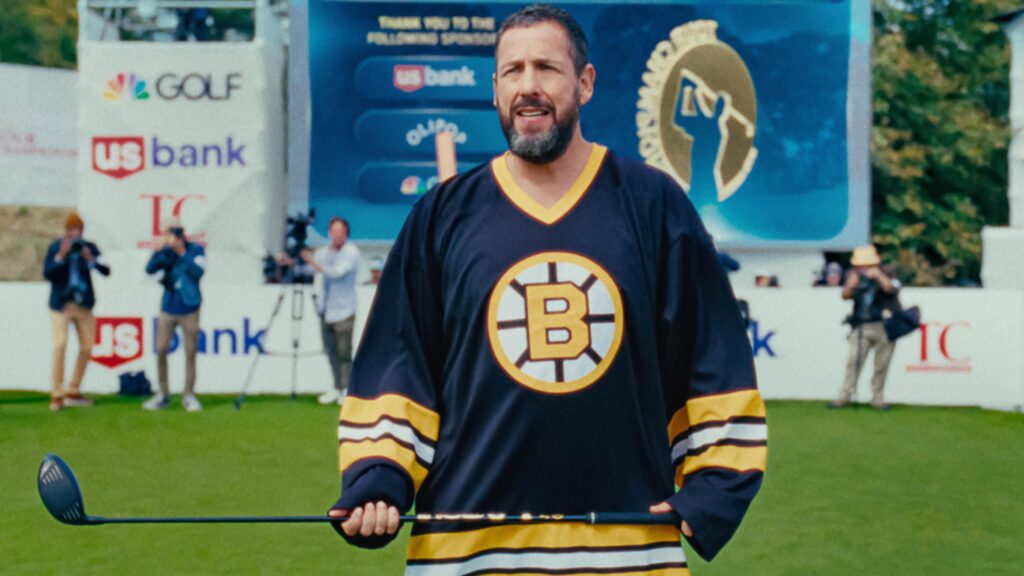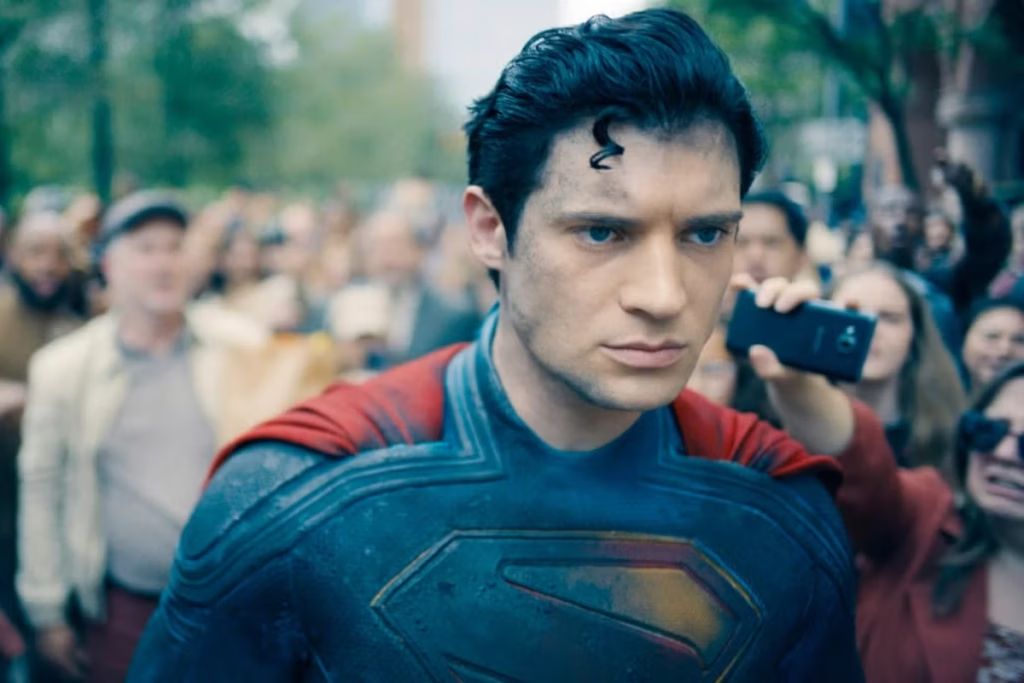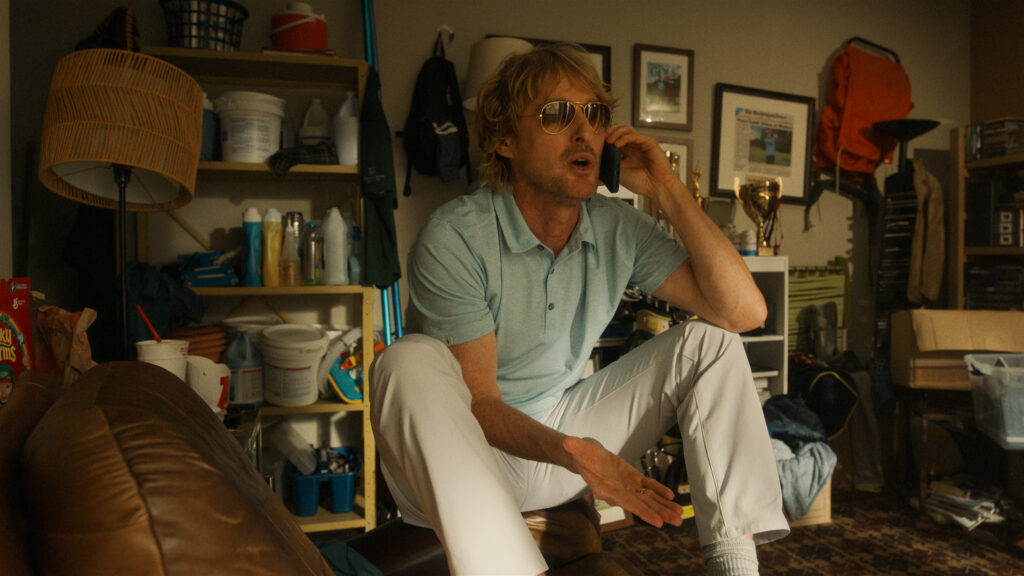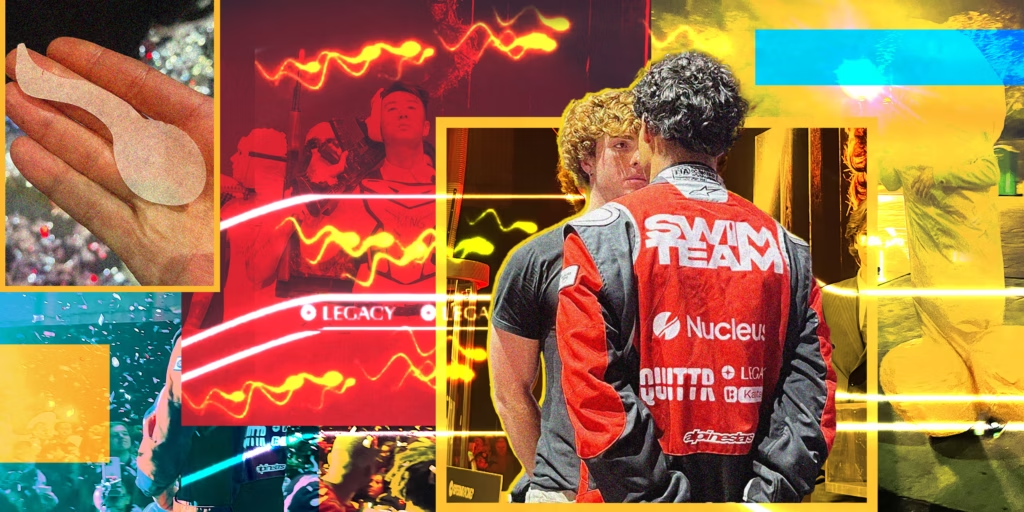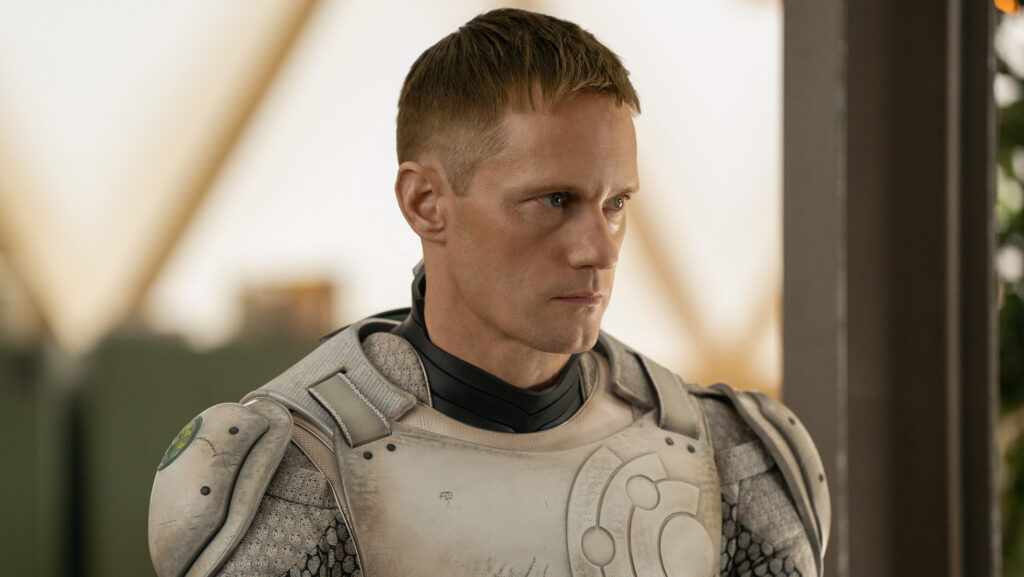Photography by Glenn Mossop
If you wanted a tangible object that captures Ash Grunwald’s attitude to life, you could do worse than look at one of his guitars. Not just any of the 15 or so I can see hanging on the black wall of his home studio near Brunswick Heads in Northern NSW. This particular one, an acoustic, has a print of a wave etched around the body, a nod to Grunwald’s dream of being a travelling musician who seamlessly combines songs and surf. He turns the instrument around to show me the other end. What looks like a random pattern is actually the word “Now” repeated around the sound hole.
“Now,” says Grunwald, who’s wearing a blue T-shirt and has his curly brown locks tied up with a colourful hair tie. “Now,” I repeat back to him. “I have a clock on one of my albums that just says ‘Now’, too,” Grunwald adds, underlining his belief in the importance of being present in the moment.
Grunwald knows inhabiting the present isn’t something most of us are able to pull off without work, hence the visual reinforcements. Something else the 45-year-old father of two knows requires application and intent? The future, specifically things you want to achieve. Writing down today what you want to accomplish tomorrow or next year is what Grunwald calls “programming your subconscious”. It’s part of making idle, often preposterous mental projections material. It’s how dreams are made.
“I don’t want to use the M word, but I started experimenting with trying to manifest certain things in my life that were absurd at the time,” he says of a period a few years ago when he was living in Bali. “I do believe you can give your subconscious a direction to be headed. Because normally we don’t. We only ever really dream or plan for things that seem within our grasp. And that’s too humble. You can’t only reach for what you think is possible. If you can reach beyond that, you can really shock the hell out of yourself.”
Grunwald should know. His dream – captured in the wave on his guitar and the title of a book he wrote a few years ago – was to surf by day, jam by night. It’s the type of fanciful existence to which many of us might aspire without ever taking any practical steps towards realising it. So, it stays a dream. It never becomes your now.

Hit man: grunwald’s built a successful career by playing from the heart.
BLUES AND ROOTS
Grunwald grew up in Melbourne and the small town of Glenburn, just outside the city, in the ’80s and ’90s, picking up a guitar when he was 10 years old. His granddad, a South African Cape Coloured man who often dressed up in outfits “like he was John Lee Hooker”, liked to play jazz. Grunwald would strum along on the bass. He took a couple of lessons, he says, but it wasn’t long before he “got stuck on the blues”. After that he didn’t really work on improving his skills. Instead, Grunwald played for feel. Still does. It’s probably the reason, he says, that he’s never got tired of playing. “From an early age I played for the emotional feeling it gave me and I reckon that’s probably why I’m a professional musician,” he says. “Not trying to be the most amazing player, but just writing songs and doing stuff that’s from the heart. I think that worked out to be a good thing in the end.”
After high school Grunwald began gigging around Melbourne while studying teaching. After graduating he became perhaps the coolest high school teacher in Australia for a couple of years, before his music career took off and his first album, Introducing Ash Grunwald, was released in 2002. “I finally quit teaching when I was able to walk up to the music shop at recess and see a copy of my album,” he recalls. “I could have enjoyed that [teaching], but I don’t think I fit into institutions very well. I’m a bit
more of a free spirit. I think I had a different destiny.”
Truth be told, he had a different dream. And it wasn’t one solely defined by music. In his early 20s Grunwald became hooked on surfing. “I’m not some masterful surfer,” he laughs.
“But my friends who are pro surfers will attest that nobody froths more than me. Rightly or wrongly, to me, it’s always been equally as important as music.”
Just how important soon became apparent. “I remember one record company really wanted me to play rurally,” he remembers. “And I said, ‘Yeah, but I can’t surf’. And they said, ‘Well, take up bush walking’. And that was it for me. I ended up leaving them. I thought, no, I want to be on the coast, because then not everything would just be about the gig, or about work. It could be an adventure as well.”
Pretty soon the dream – touring-surfing-jamming – was happening. “I’d surf every day, go to the gig and then afterwards there would be a crazy party,” he recalls. “Then I’d go to the next place and do it all again”.
This carefree, vagabond lifestyle defined the first part of his career, from the early aughts into the 2010s, as his music won acclaim and the ARIA nominations piled up. He began touring overseas, doing ski seasons in the Canadian Rockies, where he swapped surfing for snowboarding. When he couldn’t surf or board, he skated. It was a pretty cool way to spend your 20s and 30s.
In the beginning surfing kept him honest, he says. No matter how hard he partied he’d make sure he was up to catch the first wave the next morning. Over time, though, the drinking and partying began to take a hold over him. The purity of his dream was corroding.
“One of my favourite surf spots is Margaret River in WA,” says Grunwald. “I remember once it was pumping but I was too hungover to get up. I felt like a loser. I was just ‘kooking’ it.” The same thing happened in Canada. He started missing the first ski-lift in the mornings. But it wasn’t until a boat trip with some pro-surfer mates that he saw his drinking for what it was: a problem.
“Drinking is very much part of the surf culture,” he says. “You go on boat trips and it’s awesome. You’re having beers and you’re surfing, surfing, surfing, more beers, more beers. The last couple of trips, I was lucky enough to go with heroes of mine and I just remember thinking, I’m just getting slaughtered here. These guys aren’t going as hard as me. And just realising, Shit, I’m always the drunkest guy at the party. I’m always that guy. And now I’m pushing 40 and I’m that guy.” As anyone who’s been that guy knows, it can be a pretty sobering feeling.

Something to fret about: lack of live music would threaten grunwald’s livelihood.
YOU BOOZE, YOU LOSE
In 2016 Grunwald and his wife, Danni Carr, and their two daughters, Aria and Sunny, moved to Bali. It was there that he began to address his drinking and really, the hole his career had fallen into. “I had fallen off that whole Triple J, 2000s roots thing,” he says. “That was gone and I was in Bali re-evaluating. Still having a ball but wondering what the next chapter holds.”
Danni pointed out that the reasons he drank – to shake off inhibition, to feel free on stage – were actually the things alcohol was taking away from him. “You drink for inspiration on stage, to loosen up a little bit,” he says. “But
I wasn’t liking the end of the night, slurring and being a fool. After 20 years of it, it’s just the same old, same old. And you realise, you’re actually losing your edge.”
On New Year’s Eve 2017, Grunwald and his friend, Scotty Owen of The Living End, enjoyed their final boozy night out. That was it. Clean slate. If that makes it sound easy, then it’s merely the slippery economy of recollection.
In the moment, the now, it was a precarious, night-by-night proposition. Having someone to lean on in Owen and his partner, along with Danni, who were also quitting, got them through that first year. “We had a little WhatsApp group and we’d just call each other when we were feeling a bit triggered,” Grunwald remembers. “After that first year none of us wanted to go back again. I’d lost 10 kilos. I was really fit. I felt like I was surfing well and I was playing better.”
After thinking he was washed up as a musician and worrying how he’d command the stage without alcohol to fuel him, Grunwald found new energy and verve in his live performances, recapturing his youthful spirit. “You drink for a spark, but it took my spark away,” he says. “I thought it was because I was getting old. But then when I quit, I found I was freestyling again on stage, cracking jokes, making up lyrics about people in the audience. All these things that I did at the start of my career that I thought were gone.”
He describes the realisation as an “epiphany”, one that could await many ‘functioning alcoholics’ who likely have no idea just how much booze is holding them back. “If you’re somebody who drinks a fair bit, but you’re still successful at what you do, you don’t realise that you’ve been trying to run a marathon with rocks in your backpack,” he says. “The fun thing about that is when you stop, you actually pick up speed. You just fly in all the areas that you want to improve in.”
From his newfound sobriety came a commitment to taking better care of himself, through exercise and breathing. It was a commitment he put in writing and visualised happening, designating the steps he would take towards his goals as ‘musts’. “In that first year I was on fire with putting pen to paper every day in a really disciplined way,” he says. “I was doing 100 push-ups a day. That was one of my ‘musts’. And it would be 100 push-ups, 100 sit-ups, 30 chin-ups and Wim Hof breathing. It was all written down and then it would just get done.”
As for goals themselves, in order to make them seem more attainable, Grunwald always made sure to put them in the present tense. “I’d be writing out these ‘I Ams’,” he says. “You’d write, ‘I am…’ whatever the thing is. It’s sort of like teaching your subconscious this is what I am. And if you just keep writing that out every day, then you find that you’re doing those extra push-ups, you’re doing those extra sit-ups, you’re going to the gym. Because your subconscious is listening. You’re just programming it.”
Another project to come out of this fertile period was his book, Surf by Day, Jam by Night, in which Grunwald interviewed a number of high-level surfer-musicians such as Kelly Slater, Stephanie Gilmore, Jack Johnson, Pete Murray and G. Love. It was an experience he describes as “awesome” but also instructive, for it was Gilmore who confirmed to him that there was something to this idea of visualising and planning for success. “I was thinking about that stuff and weighing it up and then when I spoke to Steph Gilmore she just opened up and said ‘Yes, 100 per cent’. We’re not brought up to do that kind of thing in Australia. But she, as the greatest competitive female surfer of all time, had used that. There’s a spiritual dimension to these ultra-successful people and it’s stuff we don’t think about with our tall-poppy attitude of don’t reach too far beyond where you’re at.”
Grunwald began reaching, started grasping for things he might previously have told himself he had no business pursuing. He shared his philosophy with Danni, who asked him to imagine doing something that seemed impossible. He thought for a while. Playing at The Forum (in Melbourne), he said. Visualise yourself playing at The Forum, she urged him. “I was like, ‘That’s ridiculous’. And then I was like, ‘Well, maybe if I worked on my guitar playing, I could’. And I came up with this plan. It seemed so far off, but it just gave me something to cling onto, gave me a direction.”
And then came COVID.

THE WRITE STUFF
If playing at The Forum had seemed like a dream pre-pandemic, performing any sort of gig became a challenge once COVID arrived and effectively killed Australia’s live music scene. Grunwald was in Spain in March 2020 when COVID began to sweep the world.
“It had taken me a long time to try and break Europe and it was all coming together so it sort of gutted me,” he says ruefully. He hung on as long as he could before “fleeing the country like an action movie, racing to the airport, jumping on a plane, getting back here”. Here being a place where live music venues were shuttered.
With his income cut off, Grunwald was determined to maintain a sense of control in his life, rather than let external circumstances, however unprecedented, overwhelm him. He took to doing online guitar lessons to support his family. He also recorded a new album, Shout Into The Noise, which he describes as a return to the experimental sound of 2008’s Fish Out of Water album, fusing blues with electronica and hip-hop beats. But without touring, Grunwald’s dream wasn’t quite whole. “It’s been a tough time,” he admits. “If people really ever got to talk to a musician face to face, they’d realise that a lot of people have been affected. But even saying that I feel guilty. There’s always somebody whose shop’s closed down and lives under a bridge now.”
Grunwald concedes that by directly threatening his livelihood the pandemic challenged some of his long-held beliefs around positive thinking and self-determination. He stopped doing his visualisation exercises, stopped journalling. Effectively, he stopped dreaming. “There were times when I was worn down, just like everybody.”
He pauses and looks up at me, as if he’s remembered something. It was only yesterday, he tells me, that he actually realised he’d let things slip. That he needs to get back to putting his thoughts, plans and dreams on paper. “Having just been trying to keep my head above water these last two years, I realised, Oh, I’ve sort of lost my way and I’ve been thinking about the external things a bit too much. I’m not actually trying to program my subconscious anymore. So, I just started again yesterday. The return of the journal.”
Well, he might, for even in the dumpster fire of the last two years, a time when many of us stopped dreaming, there was proof Grunwald’s practices work. Last year, in the brief window before the arrival of the Delta variant when the country opened up, he hit the road, gigging anywhere that would have him. There were a lot of great nights but there was one that stood out. He played The Forum with Josh Teskey. “It was just amazing,” he says. “All that stuff worked out.”
It makes you wonder what Grunwald might do next. What dreams he might pursue. Whatever it is, you can be sure that, once again, he’s working on it.
Shout Into The Noise is out now. Visit ashgrunwald.com for tour dates.









